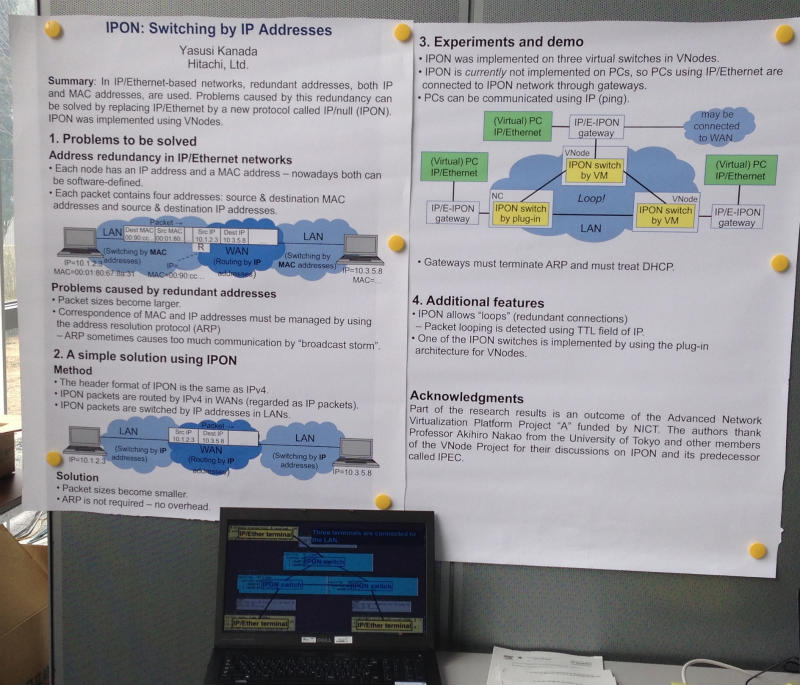Kanada, Y., and Nakao, A., IEICE Technical Committee on Information Networks (IN), 2010-9-2.
[ 日本語のページ ]
[ Paper PDF file (C) IEICE (in Japanese) ]
[ Slides PDF file (in Japanese) ]
Abstract: In the National Institute of Information and Communications Technology (NICT), 10-Gbps-class virtualization nodes (VNodes) that enables implementing non-IP protocols with any frame format are developed using network-virtualization technology. We have developed an experimental non-IP protocol called IPEC (IP Ether Chimera) on a virtual network us-ing the VNodes. In IPEC, the nodes learn addresses that can be hierarchical such as IP addresses using an algorithm that extends Ethernet switch learning algorithm. IPEC has the following features. First, IPEC realizes a simple single-layer non-IP protocol that has features of both Ethernet and IP. Second, because a group is the unit of learning in IPEC, it is more scalable than Ethernet, and mobile groups can be more efficiently learned. Third, this forwarding algorithm can be used in networks with loops and it can forward packets during failure using an alternative route. Group IDs can be used as locators, so IPEC can be regarded to realize an architecture that extends ID/Locator separation architecture. We implemented IPEC on VNodes, and confirmed that it enabled group learning and group mobility by experiments.
Introduction to this research theme:
Policy-based Networking
Keywords: Network virtualization, Non-IP protocol, Virtualization node, Address learning, ID/Locator separation, Mobility
Kanada, Y., and Nakao, A., IEICE Technical Committee on Internet Architecture (IA), 2010-12-17.
[ 日本語のページ ]
[ Paper PDF file (C) IEICE (in Japanese) ]
[ Slides PDF file (in Japanese) ]
Abstract: The virtualization-node project at the National Institute of Information and Communications Technology (NICT) is developing 10-Gbps-class virtualization nodes (VNodes) that enables implementing non-IP protocols with any frame format using network-virtualization technology. In this project, because the VNodes have been introduced into the R & D test-bed network called JGN2plus, an important challenge is to improve usability for developers (JGN2plus users). There-fore, we developed and tested a non-IP protocol called IPEC (IP-Ether-Chimera) on the experimental network using the VNodes, described the procedure and experiments, and extracted the problems and knowhow concerning usability. A problem to solve is to develop methods for avoiding careless mistakes by developers, and an obtained knowledge is that a combination of a small-scale experiment using connected several Linux PCs and a scaled-up experiment on wide-area network reduced the complexity of the development. This experiment did not need wide bandwidth, but this method will enable scaling up the experiment utilizing 10-Gbps bandwidth relatively easier.
Introduction to this research theme:
Policy-based Networking
Keywords: Network virtualization, Non-IP protocol, Virtualization node, Address learning
Kanada, Y. and Nakao, A., World Telecommunication Congress 2012 (WTC 2012), 2012-3-5.
[ 日本語のページ ]
[ Paper PDF file ]
[ IEEExplore Paper page ]
[ Slides PDF file ]
Abstract: We have developed an experimental non-IP/non-Ethernet protocol called IPEC
(IP Ether Chimera).
IPEC switches learn IPEC addresses that are structured hierarchically,
similar to IP addresses, using an algorithm that extends
the learning algorithm of Ethernet switches.
IPEC is a simple non-IP network-layer protocol that has features of both Ethernet and IP.
Unlike IP, IPEC introduces an address
group to manage multiple terminals as a group to make
learning of mobile terminals more scalable and more efficient than Ethernet.
Because an address group is the unit of learning in IPEC,
it is more scalable than Ethernet, and mobile
groups can be learned more efficiently.
In addition, IPEC tolerates loops in a network as long as a limited number of
duplicate packets are allowed, and thus, enable an alternative route against link failures.
We have implemented IPEC both
on an IPEC-capable switches using LAN cards and on a virtual
network using virtualization nodes (VNodes), which have
been developed to experiment with non-IP protocols such as IPEC.
We show evaluations that the group learning function
of IPEC is viable especially for multiple terminals moving
together concurrently.
Introduction to this research theme:
Network virtualization
Keywords: Network Virtualization

